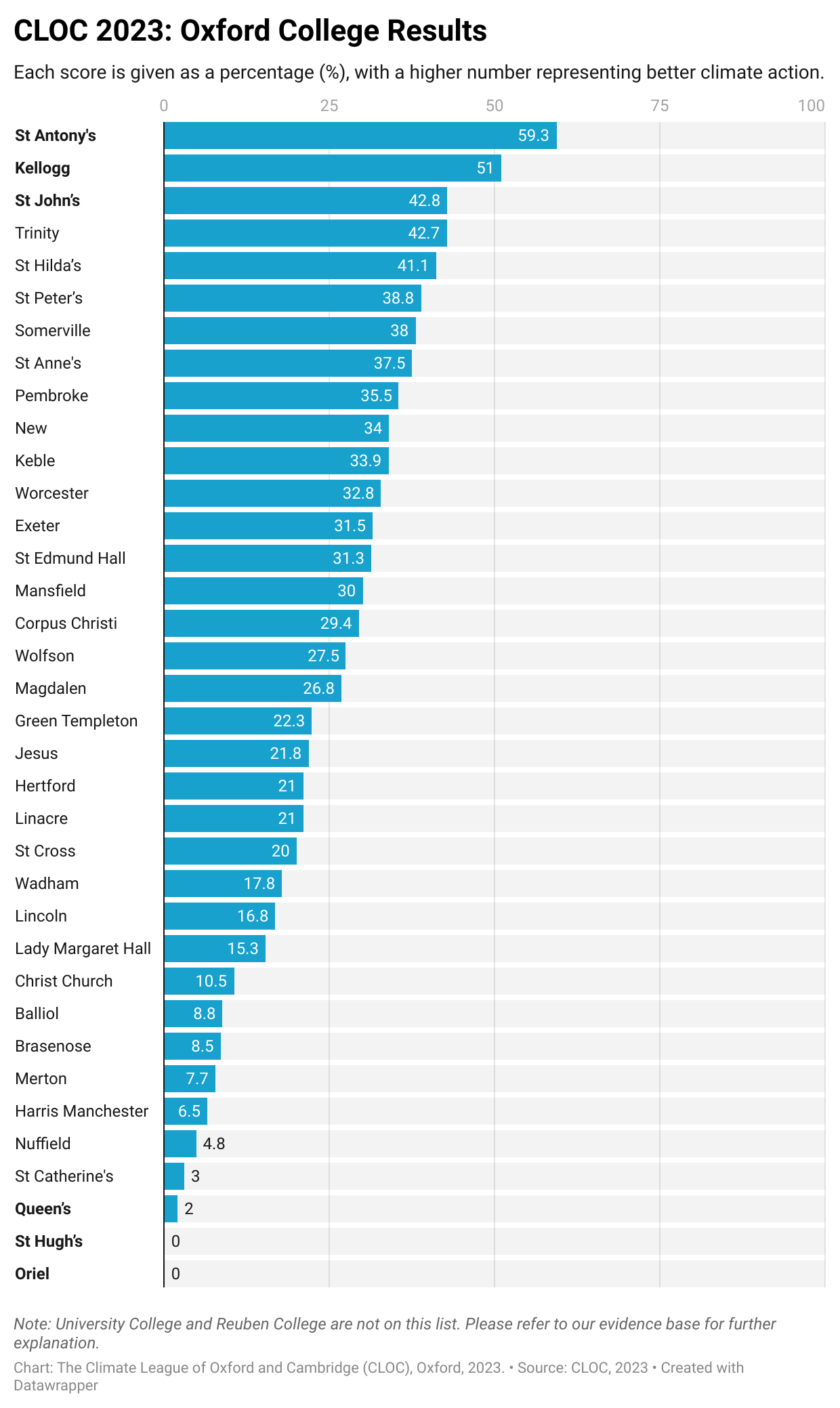The Climate League of Oxford and Cambridge (CLOC) has just released its 2023 ranking of Oxford colleges. St Hugh’s and Oriel are the worst performing colleges, both scoring 0% out of 100% on CLOC’s marking scheme. The top college, St Antony’s, managed to score just above half of the total points available at 59.3%.
CLOC team member Maria Klingsheim said: “Our ranking is strict because responding to the climate crisis requires extremely ambitious and comprehensive action.” She added that “if a college receives 50% it has done well relative to other colleges, but still has a long way to go before its climate efforts are of the standard required …”
Since the University of Oxford’s Sustainability Strategy doesn’t apply to colleges, inaction on the part of “globally influential, but also extremely wealthy institutions” risks going under the radar. CLOC sees itself as a “response … to a persistent lack of college-based climate action and opacity about the work that is being done by the colleges to mitigate climate change.” The aims of the ranking are to add pressure, push for transparency, and centralize information.

The CLOC ranking is primarily based on a questionnaire sent to every college in addition to publicly available information. This year, 17 colleges responded. Therefore, the best performing colleges, including Kellogg and St John’s, tended to have clear and publicly available sustainability documents as well as taken meaningful steps such as divesting from fossil fuels. Colleges with “little, if any, information on their climate efforts,” such as Queen’s and St Catz, are severely punished. According to CLOC, these colleges “must urgently demonstrate their seriousness on sustainability.”
While the top colleges are those most willing to engage with CLOC, this may be a feature rather than flaw. In the last iteration of CLOC, St Antony’s scored 0%. However, former GCR Sustainability Officer Clement Amponsah conducted an assessment into the poor performance and worked with “an open and supportive college administration” towards building a working plan that addresses CLOC’s criteria. Their efforts go to show that significant progress is possible, especially when “the warden, bursar, and green impact team are very passionate about sustainability which makes the implementation of projects much easier from the student side.” However, they too caution that this is still very much “a work in progress,” but hope that their public efforts can “inspire and inform other colleges.”
St Antony’s Warden, Professor Roger Goodman, told Cherwell that their ambition is to reach net-zero emissions “as soon as practically possible.” Their new Environmental Sustainability Officer, Dr Ellen MacDonald, told Cherwell that she’s “excited to be working for a college that has already committed a lot of time and effort to their sustainability goals.”
However, the Student Union’s recently published sustainability tracker corroborates that St Antony’s progress, and enthusiasm about sustainability, is much closer to an exception than the rule. Only a minority of colleges have publicly committed to any sort of target for net-zero carbon emissions, much less employ dedicated environmental staff.
CLOC team member Anna Bartlett says, “We hope our relationship with colleges and the university leads to real change.” Oriel did not respond to a request for comment, while St Hugh’s said it would need to wait until its next Governing Body meeting in two weeks.


